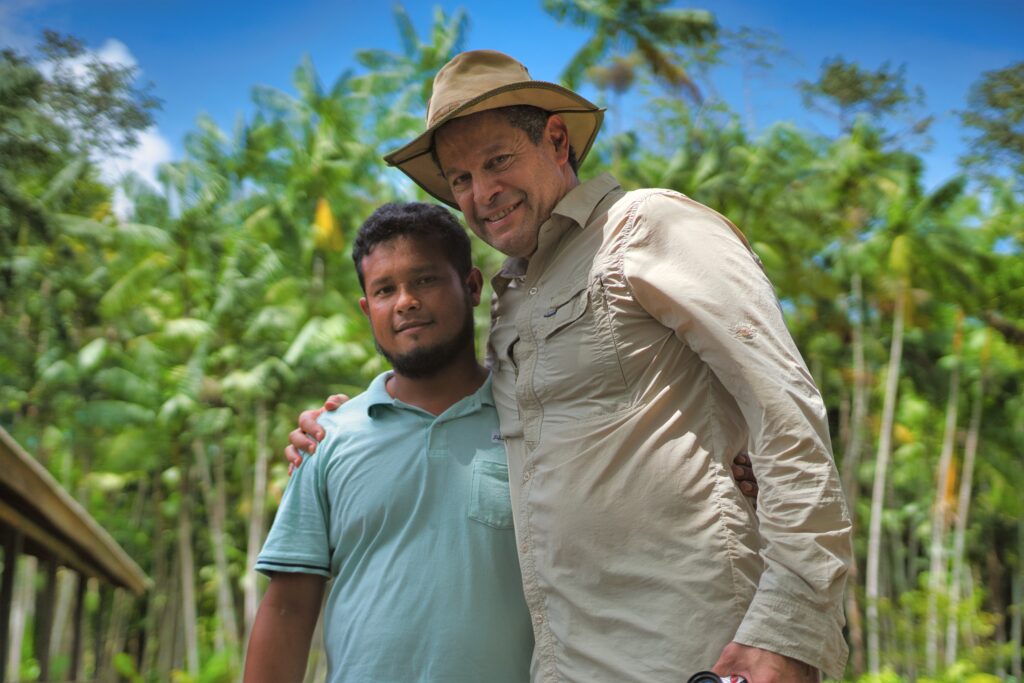Endowment fund created to finance schools, supports the training of regional leaders capable of dealing with the sustainability challenges of their biomes
In August, the technical team from Instituto Interelos embarked on a trip to the territory of Beira Amazonas, in Amapá, together with members of the governance of the Future (United Territories for Education Resources Fund), as well as potential supporters, to learn more about the realities and challenges faced by communities living in the region, particularly with regard to education.
Launched in March this year, the Future was created as part of the Interelos Rural Education Program with the aim of supporting Rural Family Homes and Agricultural Family Schools. The model adopted in these schools is alternation pedagogy, in which students spend 15 days at school and 15 days in their communities, studying traditional subjects, such as Portuguese and mathematics, but also acquiring practical skills, such as handling açaí, the creation of fish and the cultivation of vegetables, knowledge that is shared with their families, during the alternation period, strengthening sustainable subsistence practices in the community. This approach has the potential to reduce school dropouts and provide technical training for young people in the region.
During the trip, participants had the opportunity to visit the Macacoari Family Agroecological School (EFAM) and visit the cooperative's agroindustry amazonbai. The journey began in Macapá, where the team gathered and embarked across the Amazon River for an approximately four-hour journey to the territory of Macacoari. Along this route, in addition to the fascinating landscape of the Amazon biome, the crew were able to share expectations, clarify doubts and prepare for the following day's agenda.
Mariana Chaubet, member of Future's board of trustees, highlights the importance of initiatives like this: “Taking people to the territory is a way of creating involvement with the cause. It's different to talk about school, from afar, and being able to step on the school floor, breathe, look at the children, the young people, the families. Connecting governance with the context of schools is essential to bring engagement and clarity of the challenges to building solutions for this front of rural education.”
“Taking people to the territory is a way of creating involvement with the cause.”
Mariana Chaubet
Rural education
Throughout the day, the team met with cooperative members and riverside residents at EFAM, for a detailed presentation of the school's facilities in which the teachers explained the pedagogical routine, the functioning of the laboratories and the importance of learning how to handle açaí. During the meeting, there were also intense dialogues to seek possible solutions for both the Macacoari Agroecological Family School (currently closed) and the improvement of the Bailique Agroextractivist Family School (under construction).
João Paulo Pacifico, president of Future's investment committee, emphasized that presence in the territory is fundamental for there to be a real transformation in the region: “During the trip, we were able to not only get to know, but experience a little of the reality of the riverside people, as well as hear about their difficulties and talk. It’s a very different and valuable experience when you visit communities in person.”
Marcelo Alvalá, executive director of Operations & Technology at Zurich Seguros, one of the executives invited to participate in the trip, shared his impressions about the importance of investing in education in the Amazon, as well as the challenges and opportunities he observed in the region: “Investing in Future Fund is not just a financial decision, it is a commitment to preserving the Amazon forest, improving the quality of life of local communities and strengthening education.”

Education connected to the value chain
Despite the technical demand that exists in the territory, many young people are driven by the lack of prospects in the region and leave the countryside in search of better study and work opportunities, causing a rural exodus. The destination of many of these young people, however, is the informal economy of large cities. In this sense, investment in Family Schools means giving them a new horizon, a possibility to continue in the territory with the training of technicians, qualified to respond to development needs, thus retaining the intellectual capital to strengthen communities.
During the trip, it became clear that the difference between Future is to support education connected with local production chains, helping to reduce school dropouts while generating employment opportunities within the territory. One of the fund's goals is to raise R$60 million by 2027, with the aim of financing the development and expansion of rural schools that follow alternation pedagogy. This will not only expand the area of conservation in the Amazon, but will also provide quality education and opportunities for a growing number of young people in the region.
Subscribe to our Newsletter and receive our articles and releases first hand. Click here!
Investing with purpose
Marcelo Alvalá also emphasized the importance of Future as an investment with purpose and transformative impact, highlighting: “Investing in Future is a unique opportunity to invest in a purpose that makes perfect sense, both individually and for companies committed to the cause. This initiative proved to be viable, impactful and transformative due to everything it presented and everything I saw there.”
They were intense days full of knowledge, information and, above all, experience. This trip revealed not only the challenges of rural education and the açaí production chain, but also the commitment of local communities to preserving the forest, with community management, and in the fight to provide quality education for young people. O Interelos Institute and the Future Fund continue to work to ensure that schools in the Amazon remain active and that the education be a powerful tool for the sustainable development of the region.
